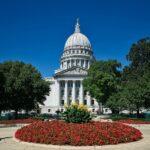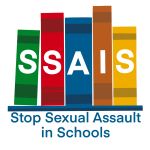 by Joel Levin, SSAIS Co-Founder and Director of Programs
by Joel Levin, SSAIS Co-Founder and Director of Programs
Update: Wisconsin SB 333 was signed into law on March 22, 2024.
Kerri Pingel, a survivor of traumatic educator harassment, recently shared her story publicly for the first time at a news conference announcing a new bill in the Wisconsin state legislature. She was the force behind the proposal that would, for the first time in Wisconsin, criminalize sexual misconduct by school staff members, contractors, or volunteers. The bill is Wisconsin SB 333 Sexual Misconduct Against a Pupil.
Kerri told the assembled reporters how as a 16-year-old student at a small private school, an administrator exploited his position to coerce her to reveal details about her sexual relationship with her boyfriend.
“The administrator instructed me to describe my part in the sexual acts to him from beginning, middle, to end in sexually graphic detail. He made vulgar and disgusting comments to me in between. Sometimes he shared graphic details of his own sexual experiences or of his genitalia with me–then just sent me back to class like nothing happened….I felt humiliated, worthless, powerless, and degraded. I will never forget the look on his face as he watched me respond to his questions. The details of all this man did and said to me as a child are repulsive and too graphic to publicly share. Due to the power imbalance and my vulnerability as a child, I thought I deserved this treatment for my wrongdoings. He isolated me from everyone, claiming he was a special mentor or friend preparing me for the Kingdom of God.”
Kerri spent several frustrating years attempting to hold the administrator and the school accountable. She faced institutional betrayal from the school itself and its accreditation board, which blamed her for the harassment. “The trauma itself impacted me horribly,” she said. “But a deeper wound came from authority who failed to take appropriate action to stop this.”
After she filed a police report, Kerri learned that the perpetrator could not be held criminally liable for his actions. Although Wisconsin has laws against adults who have sexual contact with minors, Kerri’s harasser did not touch her. “Wisconsin has no laws protecting children from sexual misconduct,” she explained. “Yet this man would face penalties in neighboring and multiple states.”
Stop Sexual Assault in Schools (SSAIS) first heard about accusations of abuse occurring at this school in an email it received in June 2020, before learning about Kerri Pingel. The email explained that a group of former students had compiled numerous testimonials of misconduct at the school over many years and were seeking accountability. The email also noted that an article about Presentation High School on the SSAIS website “seems to mirror what we are currently facing.”
Wisconsin SB 333 Sexual Misconduct Against a Pupil defines sexual misconduct as “sexual advances, requests for sexual favors, or physical contact of a sexual nature” that are “sufficiently severe to substantially interfere with a pupil’s academic performance or create an intimidating, hostile, or offensive school environment.” Under the statute, law enforcement or county agency officials learning of sexual misconduct by a school staff member or volunteer must inform the Wisconsin Department of Public Instruction. A school employee convicted of certain felony crimes against children would lose their teaching license.
Many barriers remain for those who want to take civil action against schools that fail to address educator sexual misconduct. The task is even more daunting against private institutions. Although independent or religious schools that receive federal funding are subject to Title IX prohibitions against sexual harassment, not all private schools fall into this category. And religious schools that do get federal money are often granted Title IX exemptions.
It takes sustained, persistent efforts from courageous advocates like Kerri and strong community-based support to improve and strengthen the legal avenues available to K-12 students and families to hold educators and schools accountable. Kerri explains that “as an adult, I understand what grooming is, who was at fault in this situation, why mandated reporter and statutory rape laws exist, and how some misuse power to take advantage of the vulnerable. Children do not understand these things. The problem is bigger than just me and laws need to change.”
